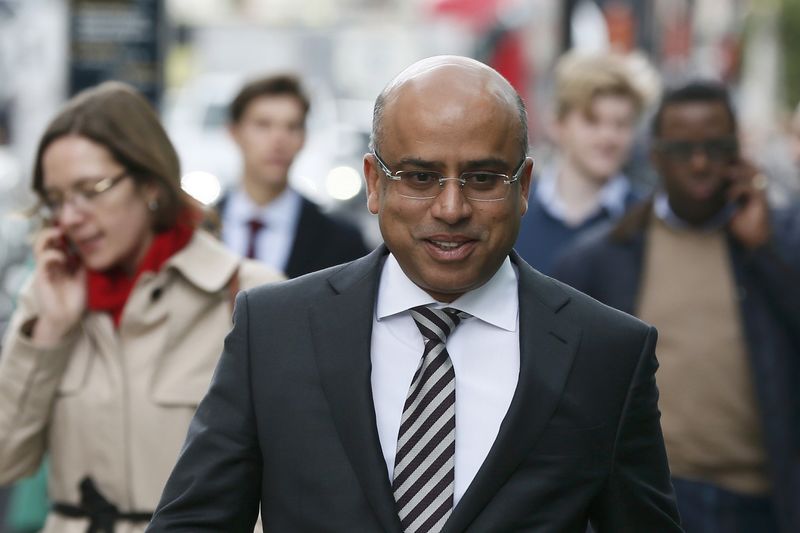By Kate Holton and Susanna Twidale
LONDON (Reuters) - The British government opened talks on Tuesday with potential buyers for Tata Steel's UK operations, including Sanjeev Gupta's commodities company Liberty Group, as it stepped up its battle to find a buyer for the loss-making business.
Accused by opposition lawmakers of being "asleep at the wheel" when India's Tata Steel put its entire British operations up for sale last week, Prime Minister David Cameron also met ministers to discuss the options for a business which employs 15,000 people.
Britain's business minister Sajid Javid met with Gupta in London to establish how firm his interest was in the business. He was later due to fly to Mumbai to meet Tata Chairman Cyrus Mistry to agree the process for a sale.
Gupta, who has bought other distressed steel assets in Britain, said the meeting was "positive" and the government was "highly supportive" and "actively engaged" in finding a long-term solution.
"The next step is for Tata to define the formal sales process and request indications of interest from potential buyers," he said in a statement after the meeting.
The government has not said which other potential buyers it has met but Javid told Sky News "where the buyers are coming forward, we're ready to work with them."
Gupta's Liberty Group is a metals company with assets in Asia, Africa and Britain, and production capacity in steel exceeding 3 million MT a year.
He has not yet carried out due diligence on the business which includes the huge Port Talbot plant in south Wales but said that site could be saved if the giant blast furnaces were replaced with facilities to process imported slab steel into higher grade product or make steel from scrap metal rather than iron ore.
Carwyn Jones, the first minister of Wales, said the government appeared willing to discuss solutions for the firm's pension deficit, structural challenges and high energy costs that prompted Tata to walk away.
Britain, the birthplace of the modern steel industry, has shed thousands of jobs from the sector in recent years due to high costs and historically low steel prices which have been dragged down by cheap Chinese imports.
But the announcement from Tata, Britain's biggest steel producer, has exposed the government to accusations that it has failed the country's industrial sector.
Steelmakers in Britain pay some of the highest energy costs and green taxes in the world as a result of policies that were designed to promote investment in low-carbon electricity generation such as wind farms or nuclear plants.
With the costs passed on to consumers, those firms which use the most power, such as steelmakers, say they are struggling to cope. A domestic carbon tax for example is paid on top of a European carbon price.
Documents released last month show British businesses would pay 340 million pounds more in carbon costs than their European counterparts in 2016-17, with the gap rising to 1.2 billion pounds by 2020-21.
But the government said it has compensated industry for some of these costs and plans to do more in the future. It maintains the fundamental problem facing the industry is the collapse in the price of steel, caused by over capacity in China.
Gupta said the industry's problems were down to a lack of investment and forward thinking, but he added that more could have been done to reduce the costs of energy and business taxes.
"Energy prices have been improved but not enough; more should have been done and faster," he said in an interview with ITN.
POLITICAL HEAT
Jones said he had been heartened by the government's approach after he met with Cameron and Javid at Downing Street.
"There was an acceptance that the issue of pensions will need to be looked at in order for a sale to take place, the issue of energy prices will have to be looked at, and the issue of tariffs to protect UK steel in the future," he told Sky News.
"Discussions have taken place with buyers. They're early days yet but we do have something to build on."
Gupta said the assets could be modernised with electric arc furnaces instead of the giant blast furnaces. About 70 percent of steel in the world is produced using blast furnaces which use raw material, mainly iron ore, while the rest is produced via electric arc furnace which uses recycled steel or scrap.
Industry analysts have said the use of scrap will increase in coming years.
Gupta said staff working on the blast furnaces could be retrained.
"We have an alternative suggestion which is to still make hot metal but to make it from local raw material rather than imported raw material, so it's a change of technology rather than ending liquid steel making," he said.
"If we get involved in Port Talbot we will only do so on the basis that we are confident there will not be any mass redundancies."
One industry analyst who asked not to be named due to company policy said one option for steel companies in developed economies was buying cheap slab steel and re-rolling it to produce a higher quality product.

However he noted that Britain's high energy costs and need to invest in the plant to catch up with rivals already pursuing this strategy meant the country was at a disadvantage.